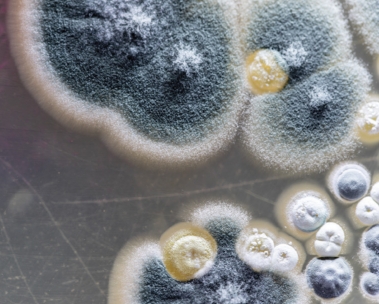HEALTHY GEEZER

Avoid exposure to mold spores
Q. What is mold, and why does it make me sick?
There are many types of molds, which are fungi that thrive where it is damp and warm. They reproduce by spreading spores, asexual reproductive bodies. Spores are invisible to our eyes, and they float through outdoor and indoor air. Molds that cause allergies include Alternaria, Aspergillus, Cladosporium and penicillium.
 If you are allergic to molds, your immune system overreacts when you inhale spores. Mold allergy symptoms can include sinusitis, sneezing, runny or stuffy nose, cough, postnasal drip, itchy and watery eyes. If you want to know if you are allergic to molds, see an allergist who can test you for your reaction to molds.
If you are allergic to molds, your immune system overreacts when you inhale spores. Mold allergy symptoms can include sinusitis, sneezing, runny or stuffy nose, cough, postnasal drip, itchy and watery eyes. If you want to know if you are allergic to molds, see an allergist who can test you for your reaction to molds.
[Personal note: I’m allergic to several molds. I learned this after seeing an al lergist.
One damp evening years ago, I had our whole-house fan on. I sat in front of a window that was letting in a heavy stream of night air. Within a half-hour, I had to go to bed with what felt like the flu.] Reducing exposure to spores is the best way to avoid symptoms. Here are some ways to keep mold spores away:
• When doing yard work — especially raking leaves — wear a dust mask over your nose and mouth. Mold is abundant where leaves or other vegetation are decomposing.
• When the mold count is high, do not drive with your car windows open. Use the air-conditioning with the windows closed.
• When the nights are wet, sleep with your windows closed. This is when the concentration of spores is the highest.
• Reduce your outdoor time when the weather is wet. The last thing you should do if you have an allergic reaction to molds is go out for a run or bike ride on a damp day.
• Put a dehumidifier anywhere in your home that is musty.
• Air-conditioning in your home is a must if you have allergies. Clean the AC filters often.
• Ventilate bathrooms, especially after bathing or showering.
• Clean bathroom and basement wall surfaces regularly with a bleach solution.
• Remove leaves and vegetation from around the foundation of your home. Clean gutters often.
You can’t avoid mold spores completely.
However, there are medications to help you deal with your allergies.
There are non-drowsy antihistamines for itching, sneezing and runny nose. And there are nasal sprays for relief from congestion.
Immunotherapy, also known as allergy shots or vaccinations, can alleviate allergy symptoms. However, shots don’t work on all allergies or all people. The shots are only moderately effective against mold allergy.
Rinsing your nose with salt water can help with nasal symptoms brought on by a mold allergy. There are convenient saline nasal sprays available at drug stores.
Fred Cicetti is a freelance writer who specializes in health. He has been writing professionally since 1963. Before he began freelancing, he was a reporter and columnist for three daily newspapers in New Jersey. If you would like to ask a question, write to fred@healthygeezer.com.
